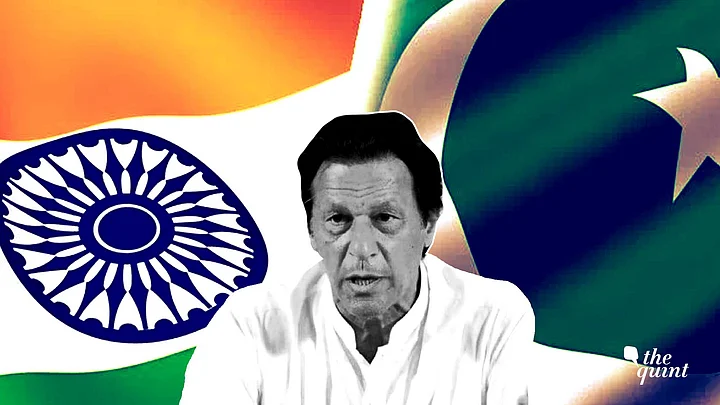On 9 December, one week before the fiftieth anniversary of fall of Dhaka marking the formal break-up of the 1947 Pakistan and the liberation of Bangladesh, Pakistan's prime minister Imran Khan delivered the keynote address to the ‘Islamabad Conclave 21’.
The event was organised by the Institute of Strategic Studies Islamabad (ISSI) to emphasise the importance of peace and prosperity in South Asia. Khan, who is the patron-in-chief of the institute, could not resist focussing on his familiar criticisms of the Modi government and its ideology.
Imran Khan Should Have Been Somber & Introspective
Khan could have turned introspective to look at the causes of the greatest disaster to have befallen Pakistan. He could have expressed sorrow for the Pakistan army’s genocide against its own citizens. He could have also spoken against the ills of army rule. But all this would have required courage which Khan obviously does not have. So, he chose to target the Sangh Parivar and the Modi government
ISSI’s press release of Khan’s address notes “He (Imran Khan) was of the view that the RSS and the Hindutva ideology is a tragedy for the Indians themselves and this has led to unprecedented marginalisation in the country”.
Interestingly, the Pakistan prime minister focussed on ideological developments in India at a time when a group of workers and others killed and burnt the body of a Sri Lankan engineer in Sialkot for his allegedly blasphemous conduct. The leaders of the group took selfies with the burnt body.
Pakistan Needs to Focus on Itself, Not on India
Khan should, therefore, pay attention to his country’s descent into fundamentalist barbarism instead of pointing fingers at others. He can, however, be hardly expected to do so though because Pakistan has used extremists and terrorists to pursue its foreign policy agendas against India and in Afghanistan.
Khan needs to understand this basic difference between Pakistan and India but it is unlikely that he would do so. Clearly, the brief interlude in the middle of this year when it seemed that India and Pakistan were moving to reduce tensions is now over. Khan’s return to diatribe against the RSS and Hindutva support this assessment; in the middle of this year he had pressed the pause button on his fulminations against the Sangh Parivar.
Khan also asserted in his ISSI speech that India-Pakistan talks are not possible because of the BJP government’s “religious nationalism”. It is ironical that the prime minister of a country which was created on the basis of “religious nationalism” should be making such an argument on the possibility of India-Pakistan dialogue.
India's People Will Resolve India's Issues
In any event, it is for the Indian people to decide the country’s ideological complexion as long as it adheres to the constitution’s core values. That is a solemn commitment which does not admit any dilution. This said, the public culture of all societies and polities undergoes changes with the passage of time. That process of transformation is taking place and will continue to do so in India, too.
Besides, so long as developments in a country do not impact on any other country, they remain purely domestic and within its sovereign jurisdiction. This of course assumes that the country has corrective mechanisms to address the violations of its citizen’s rights and that there are no massive break-down in the rights’ situation. The fact is that Indian democracy provides for the redressal of grievances while a culture of impunity prevails in military-dominated Pakistan.
India's unchanged Position on Dialogue with Pakistan
On dialogue, the BJP government’s point of view is entirely valid. It is in keeping with the positions of previous governments: so long as Pakistan, irrespective of who leads it, does not give up terrorism India will not engage it. This is a logical position to take and it is also rooted in international law.
However, previous prime ministers and PM Modi, too, till the summer of 2016 made exceptions to their positions to engage Pakistan. After 2016, Modi has formally adhered to this policy but contact with Pakistan has continued on the back channel.
Imran Khan reiterated Pakistan’s traditional view on India-Pakistan ties. He said “Kashmir has kept the peace of South Asia hostage… We hope for India to have such a government that can resolve the conflict with logic and sanity. It is the only problem between India and Pakistan. Till the last-minute Pakistan will try to resolve the problem through dialogue”.
Khan's Kashmir Contradiction and Loose Warnings
Khan's statement shows a basic contradiction: if engagement with the Modi government is ruled out with whom will Pakistan dialogue “till the last minute”? Besides, the formulation suggests a warning which, of course, India should simply ignore.
The fact is that Kashmir is a manifestation of Pakistan’s view that India is a permanent enemy. In moments of candour some Pakistanis admit that even if the “Kashmir dispute” is resolved bilateral ties will remain problematic because, they stress, that India is “hegemonic”. Indeed, General Pervez Musharraf said so soon after he became Pakistan’s army chief.
It is also interesting that Khan wants “logic and sanity” to be the guides to resolve the Kashmir issue. Certainly, Pakistan has never demonstrated sanity on Kashmir. It has been obsessed with it to its own detriment. As for logic, the Pakistani stand has been devoid of it. With the consolidation of religious extremism and fundamentalist theologies in Pakistan it is impossible to foresee Pakistan becoming ‘sane and logical’ in its approaches towards India.
(The writer is a former Secretary [West], Ministry of External Affairs. He can be reached @VivekKatju. This is an opinion piece and the views expressed above are the author’s own. The Quint neither endorses nor is responsible for them.)
(At The Quint, we question everything. Play an active role in shaping our journalism by becoming a member today.)
